Do you know that you could use hydrogen peroxide in your garden to give it a little extra boost? While plenty of fertilizers and plant foods are on the market, there’s one solution you may not have considered yet: hydrogen peroxide.
Are you a gardening enthusiast? Check out these helpful articles to take your gardening game to the next level:
That’s right, the same solution you use to disinfect cuts and scrapes can work wonders in your garden. In this article, we’ll explore how hydrogen peroxide can benefit your plants and share some tips for incorporating it into your gardening routine.
Get ready to learn how to use this common household miracle solution in your garden.
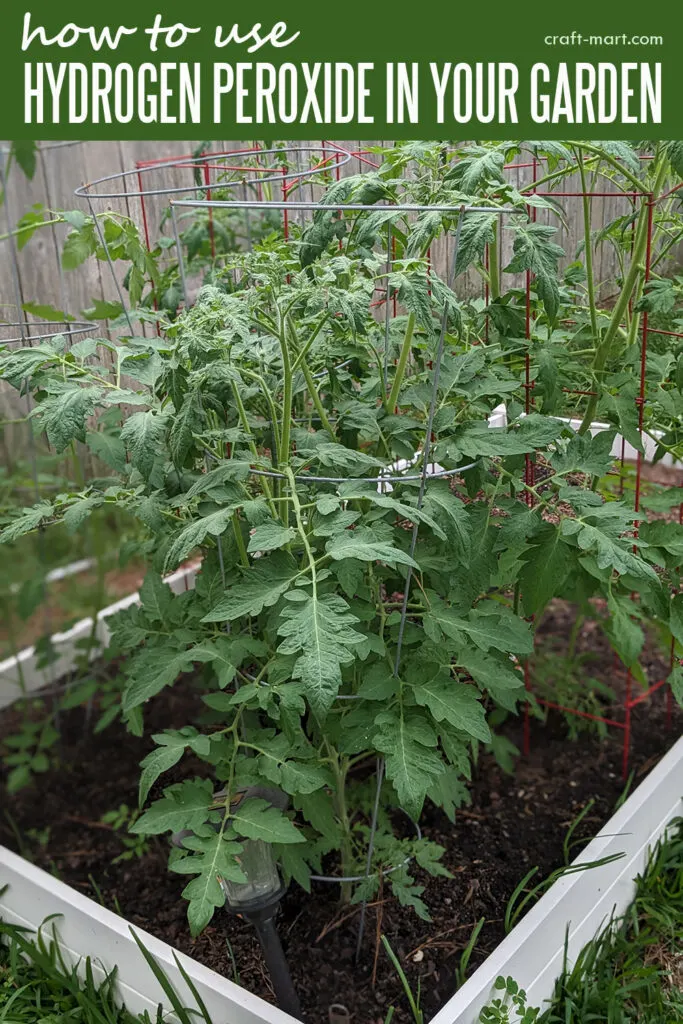
What is Hydrogen Peroxide and How Does it Work?
Hydrogen peroxide is a chemical compound that consists of two hydrogen atoms and two oxygen atoms. It is a colorless and odorless liquid that is commonly used as a disinfectant for wounds and surfaces.
However, in recent years, hydrogen peroxide has gained popularity among gardening enthusiasts for its ability to benefit plants.
So, how does it work? When hydrogen peroxide is applied to soil or plants, it releases oxygen molecules that help to improve soil aeration. This, in turn, promotes root development and growth. Additionally, hydrogen peroxide has antimicrobial properties that can protect plants from harmful bacteria and fungi.
Incorporating hydrogen peroxide into your gardening routine can benefit your plants. From helping to ward off diseases to promoting growth, it’s a versatile solution that can help take your gardening game to the next level.
Continue reading to discover the many benefits of using hydrogen peroxide in your garden.
Benefits of Using Hydrogen Peroxide in Your Garden
In addition to being an effective solution for combating plant diseases, hydrogen peroxide has numerous other benefits for your garden. For starters, it can help to improve soil aeration by releasing oxygen molecules.
This can promote root development and growth, which ultimately leads to healthier and more robust plants.
Another benefit of using hydrogen peroxide in your garden is its ability to protect plants from harmful bacteria and fungi. Its antimicrobial properties make it an excellent solution for preventing diseases like root rot, powdery mildew, and even some types of blight.
But the benefits don’t stop there. Hydrogen peroxide can also help to increase the availability of oxygen in the soil, which can further promote healthy growth and development.
Because it’s a natural solution, you won’t have to worry about harmful chemicals or toxins contaminating your garden – a win-win for both you and your plants.
Now that you know the benefits of using hydrogen peroxide in your garden, it’s time to learn how to incorporate it into your routine.
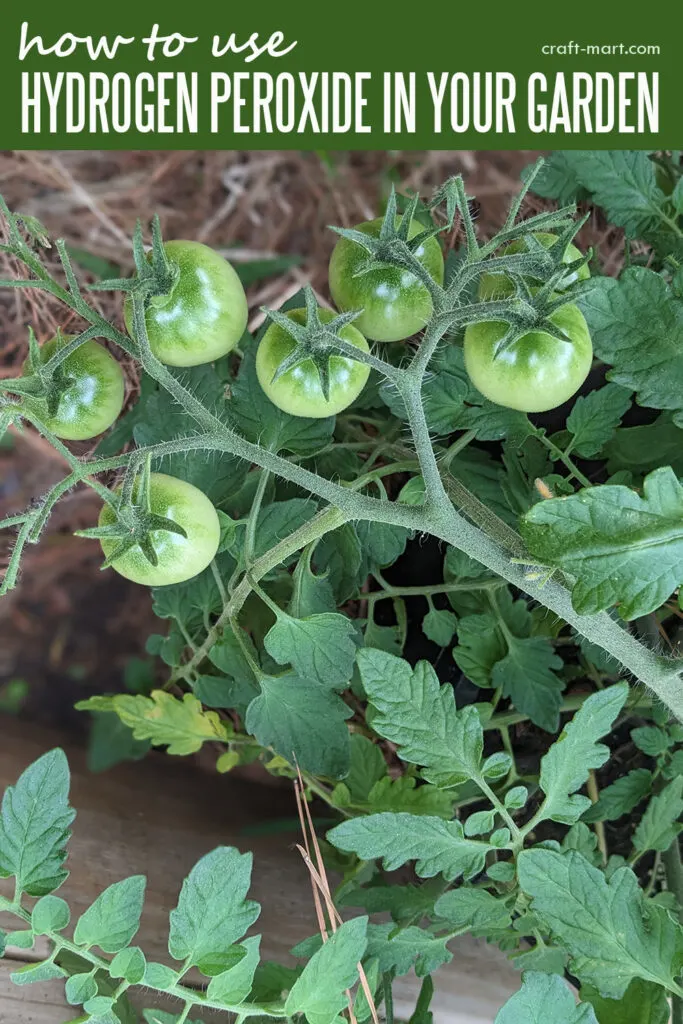
How to Use Hydrogen Peroxide in Your Garden
To start incorporating the benefits of hydrogen peroxide in your garden, it’s best to use a diluted solution. One option is to mix one teaspoon of hydrogen peroxide per gallon of water and use it to water your plants.
This can help to boost overall plant health and vigor.
Fighting Plant Diseases
In addition to its remarkable benefits in enhancing plant growth, hydrogen peroxide can also be utilized to fight plant diseases. By using a solution of hydrogen peroxide and water, you can prevent and treat a variety of fungal, bacterial, and viral infections on your plants.
To create a natural homemade pesticide, mix 1 cup of hydrogen peroxide with 1 cup of water. Next, test the solution on a small area of the plant. Furthermore, wait at least three days before spraying it generously across the entire surface.
This solution also serves as an effective preventative measure against mold and mildew growth in your garden. Additionally, hydrogen peroxide can be used to sanitize your gardening tools between uses, thus, reducing the spread of disease.
Improving Soil Quality
Another amazing benefit of hydrogen peroxide in gardening is its ability to improve soil quality. Soil structure and nutrient content play a crucial role in the growth of plants. Unfortunately, over time, soil quality can diminish due to various factors, such as overuse and poor maintenance.
When the soil is deficient in essential nutrients, plants may struggle to grow and become susceptible to disease and pests.
Hydrogen peroxide can help improve soil quality by increasing oxygen levels in the soil, which promotes healthy root growth. Additionally, it can break down organic matter, making it easier for plants to absorb essential nutrients from the soil.
The use of hydrogen peroxide in the soil can also help balance the pH level, which is vital for the proper absorption of nutrients.
By integrating hydrogen peroxide into your gardening routine, you can achieve healthy soil and, in turn, healthier plants. To use hydrogen to aerate your soil, mix a pint of peroxide with a gallon of water and water your established plants with this solution weekly for the best results.
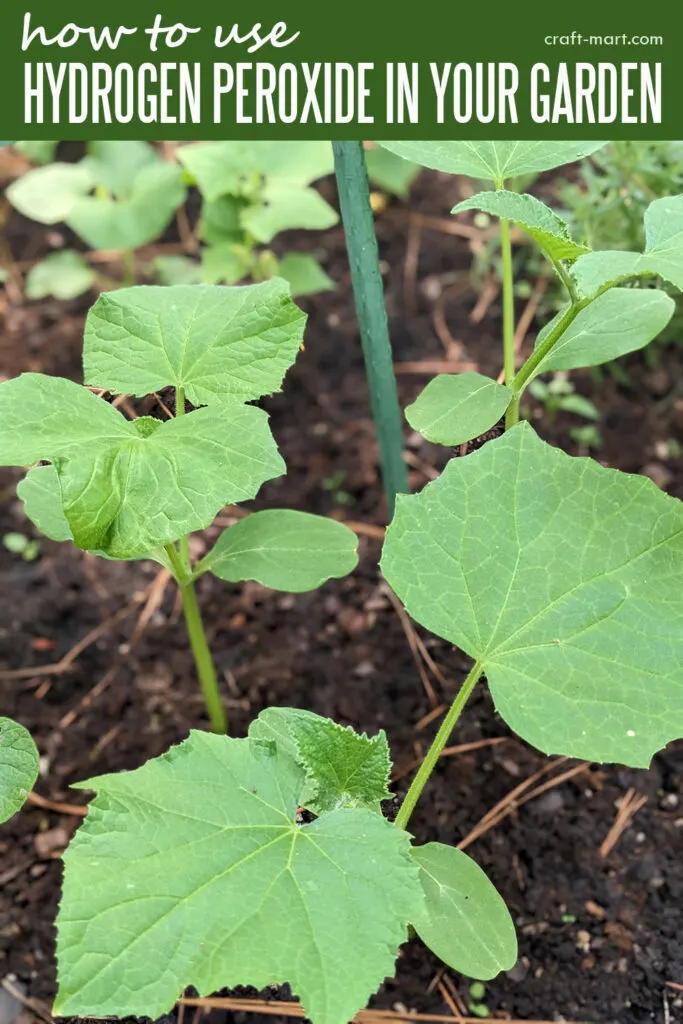
Boosting Seed Germination with Hydrogen Peroxide
When it comes to starting a new garden or planting new seeds, hydrogen peroxide can be an effective tool. By soaking your seeds in a hydrogen peroxide and water mixture (1-2 tablespoons of hydrogen peroxide per cup of water), you can increase the chances of successful germination.
The hydrogen peroxide helps to kill off any harmful bacteria or fungus on the seed’s surface, preventing its growth and promoting a healthy start for your new plants.
In addition to soaking seeds, hydrogen peroxide can also be used to water your young plants. When mixed with water (1 tablespoon of hydrogen peroxide per gallon of water), it can help break down any organic matter in the soil, providing valuable nutrients to your growing plants. This can not only improve the health of your plants but can also stimulate growth, leading to more significant yields.
With hydrogen peroxide as a secret weapon, your garden can thrive. In the next section, we’ll explore how hydrogen peroxide can also be used to kill weeds, providing a natural and effective weed control method for your garden.
Killing Weeds with Hydrogen Peroxide
Another great use for hydrogen peroxide in the garden is as a natural weed killer. Many weed killers on the market contain harmful chemicals that can harm both your plants and the environment. However, hydrogen peroxide is a safe and effective alternative.
To use hydrogen peroxide as a weed killer, simply mix it with water (1 part hydrogen peroxide to 2 parts water) and spray it directly onto the weeds. The hydrogen peroxide will break down the cell walls of the weeds, killing them off without harming surrounding plants.
Not only is this method eco-friendly, but it’s also cost-effective. You can purchase hydrogen peroxide at any drugstore for a fraction of the cost of commercial weed killers.
Using hydrogen peroxide in your garden is a great way to naturally and effectively control weeds while keeping your plants healthy and thriving. In the next section, we’ll explore how hydrogen peroxide can prevent root rot in your plants, helping them grow even stronger.
Preventing Root Rot
Hydrogen peroxide is not only a great way to control weeds in your garden, but it can also prevent root rot in your plants. Root rot is a condition where the roots of a plant start to decay due to overwatering, poor drainage, or fungal infection. This can lead to stunted growth, yellowing leaves, and eventually, the death of the plant.
To prevent root rot, mix one part hydrogen peroxide with three parts water and water your plants with the solution once a week. The oxygen in the hydrogen peroxide will help to kill any harmful bacteria or fungi in the soil, while also promoting healthy root growth.
In addition to preventing root rot, using hydrogen peroxide in your garden can also accelerate composting. By adding a small amount of hydrogen peroxide to your compost pile, you can help to break down organic matter more quickly, resulting in nutrient-rich soil for your plants.
Overall, hydrogen peroxide is a versatile and eco-friendly tool that every gardener should have in their arsenal. Whether you’re looking to control weeds or promote healthy plant growth, hydrogen peroxide is an affordable and effective solution that can help you achieve your gardening goals.
Use Hydrogen Peroxide to Accelerate Composting
Adding hydrogen peroxide to your compost pile can be a game-changer for gardeners. Composting is an essential part of creating nutrient-rich soil, but it can often take a long time for organic matter to break down completely.
By introducing hydrogen peroxide into the mix, you can speed up the process and have usable compost in a shorter amount of time. This means more nutrient-rich soil for your plants and more efficient use of your gardening space.
Plus, as an eco-friendly solution, hydrogen peroxide doesn’t harm the environment or pollute the soil in any way. With all these benefits, it’s no wonder hydrogen peroxide is a secret garden tool every gardener should have. And if that’s not enough, keep reading to learn how hydrogen peroxide can also help deter pests from your garden.
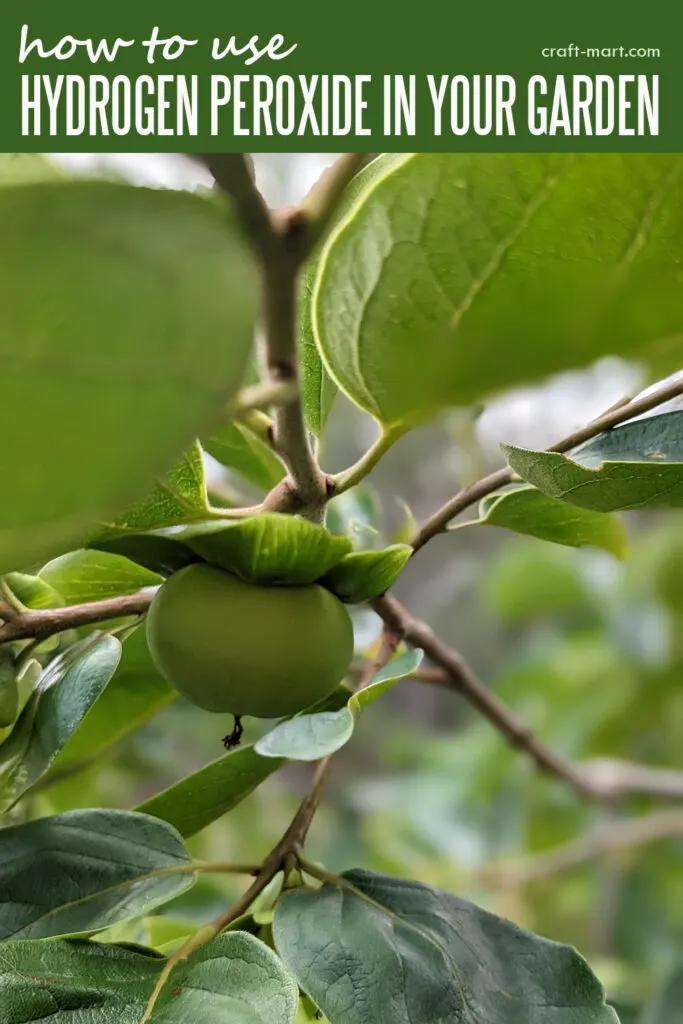
Deterring Pests
Hydrogen peroxide isn’t just useful for accelerating composting; it can also help deter pests from invading your garden. Pests like aphids, spider mites, and even fungi can harm your plants and reduce the yield of your garden. By mixing one part hydrogen peroxide with nine parts water, you can create a natural and non-toxic solution to keep pests away.
Simply spray the mixture directly on your plants or soil to deter pests. It’s important to note that hydrogen peroxide should be used with caution and in moderation, as using too much can harm beneficial organisms in your soil.
In addition to deterring pests, hydrogen peroxide can also revive sick plants. If your plants are suffering from root rot or other fungal diseases, hydrogen peroxide can help by increasing oxygen levels at the root zone and killing harmful bacteria. Simply mix one teaspoon of hydrogen peroxide with one cup of water and water your plants as usual. This can help revive your plants and improve their overall health. With all these benefits, it’s no wonder hydrogen peroxide is a must-have tool for any serious gardener.
Reviving Sick Plants
Hydrogen peroxide not only helps keep pests at bay, but it can also come in handy when reviving sick plants. When plants are suffering from root rot or other fungal diseases, the solution can increase oxygen levels at the root zone and kill harmful bacteria. A simple mixture of one teaspoon of hydrogen peroxide with one cup of water can be used to water your plants as usual. This can help revive your plants and improve their overall health. However, caution must be taken when using hydrogen peroxide as using too much can harm beneficial organisms in your soil.
With all the benefits of hydrogen peroxide, it’s a valuable tool for any serious gardener. In addition to its pest deterrent and plant-reviving properties, it can also be used to clean garden tools. By diluting hydrogen peroxide with water and using it to clean your tools, you can prevent the spread of plant diseases and ensure that your tools are clean and ready to use for your next gardening task.
Cleaning Garden Tools
Keeping your garden tools clean is essential for maintaining the health of your plants. Dirty tools can easily spread diseases and pests to your garden, ultimately leading to poor plant growth and production. That’s where hydrogen peroxide comes in handy.
To clean your garden tools, simply mix one part hydrogen peroxide with two parts water and soak your tools in the solution for 5 to 10 minutes. After soaking, rinse your tools thoroughly with water and dry them off completely before storing them. This simple process not only ensures that your tools are clean and ready to use but also helps prevent the spread of harmful bacteria and fungi in your garden.
It’s important to note that while hydrogen peroxide is a powerful cleaning agent, using too much can harm beneficial organisms in your soil. It’s best to use it in moderation and always dilute it with water before using. With its many uses in the garden, hydrogen peroxide is a versatile tool that no gardener should be without.
Incorporating hydrogen peroxide into your gardening routine can provide many benefits for both you and your plants. However, it’s important to keep in mind some safety precautions to ensure that you’re using it properly.
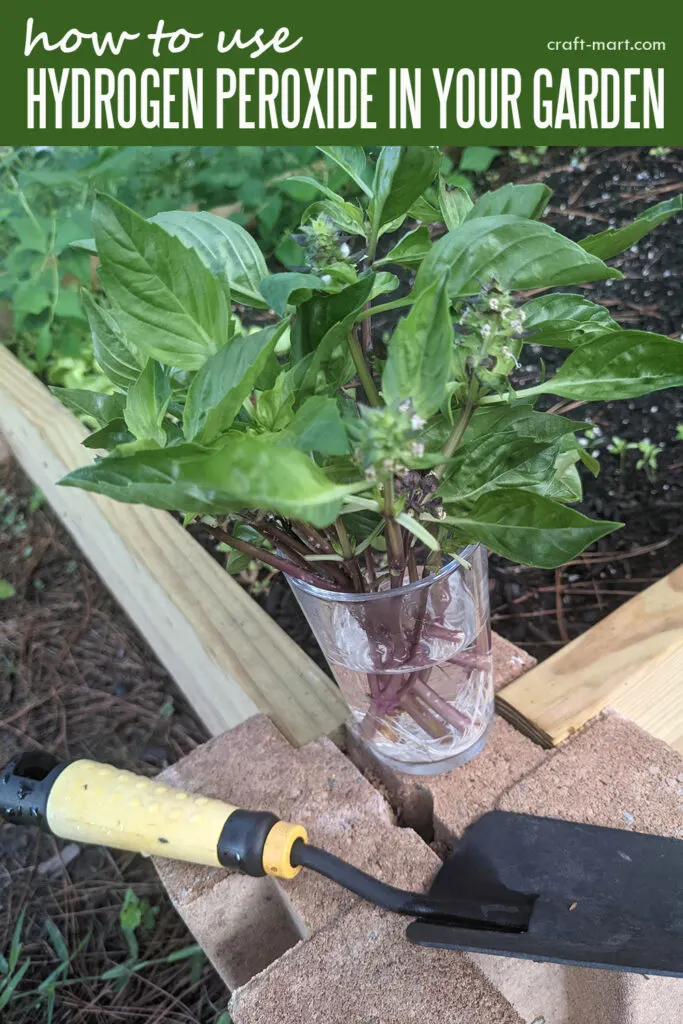
Safety Tips for Using Hydrogen Peroxide in Your Garden
Incorporating hydrogen peroxide into your gardening routine can provide incredible benefits for your plants. However, safety should always come first. Here are some tips to ensure you’re using hydrogen peroxide safely in your garden:
- Wear protective gear
When handling hydrogen peroxide, it’s essential to wear protective gear such as gloves and eyewear. Hydrogen peroxide can be harmful if it comes into contact with your skin or eyes, so precautions must be taken. - Dilute appropriately
Hydrogen peroxide can be very potent in its undiluted form, so it’s important to dilute it appropriately. A ratio of one part hydrogen peroxide to six parts water is recommended for most gardening applications. - Follow instructions
Always read and follow the instructions on the hydrogen peroxide container. Different brands and strengths may require different handling or dilution methods. - Store properly
Store hydrogen peroxide in a cool, dry, and well-ventilated area, away from direct sunlight. Keep it out of reach of children and pets.
By following these safety tips, you can enjoy the benefits of using hydrogen peroxide in your garden without any harm to yourself or your plants.,
In conclusion, hydrogen peroxide is not just a medicinal solution, it’s also a game-changer for gardening enthusiasts. With its ability to enhance soil health, prevent root rot, and boost plant growth, this unassuming solution has proven to be a versatile tool in any gardener’s toolkit.
Don’t forget to check out our helpful tool to plant your garden right for your hardiness zone:
By following a few simple tips on how to use hydrogen peroxide safely, you can take your gardening skills to the next level and watch your plants thrive. So go ahead and give it a try – your garden and your green thumb will thank you.
As the saying goes, “healthy soil equals healthy plants,” and hydrogen peroxide is the natural miracle solution that can help make that a reality.
